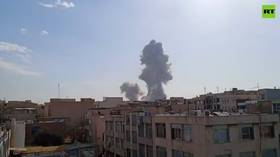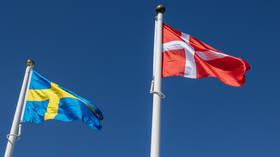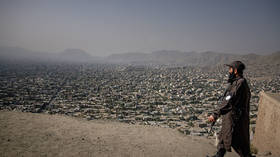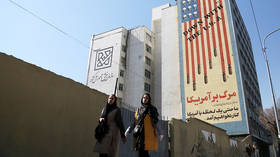Is Libya ripe for 2nd civil war?
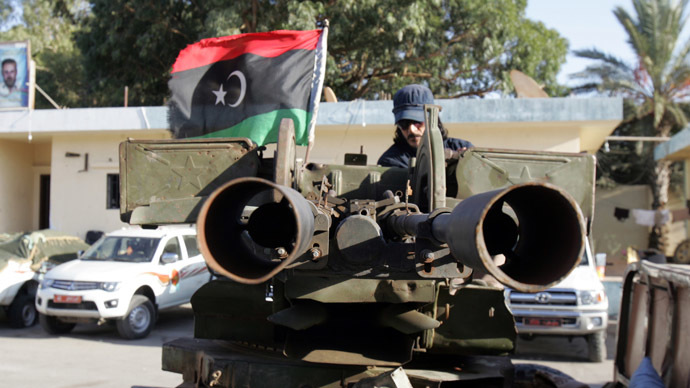
The Libyan central government is so far failing to assert its authority over the country, buried in rampant infighting and lawlessness that could lead to civil war.
The failed coup that culminated in last month’s kidnapping of
Libyan PM Ali Zeidan demonstrated the central government’s
glaring lack of authority. Lawlessness has become an everyday
feature of life; foreign embassies are targeted and attacked,
rival militias and branches of Al-Qaeda vie for power, and the
country’s borders are porous and outside the government’s
control.
In another symbolic blow, a federalist movement in the eastern
Cyrenaica region has declared an autonomous regional government.
This region, known as Barqah, was the cradle of the revolt
against Muammar Gaddafi and has been historically marginalized,
despite being a generator of economic activity, with 80 percent
of Libya's proven oil reserves and several strategic ports and
oil refineries within its territory.
The people of Barqah seek autonomy and federalism to combat the political and administrative marginalization meted out by the central government in Tripoli, which refuses to recognize the region’s aspirations of self-rule, and has previously warned that it would forcefully respond over attempts to break away.
Federalist militias and tribes have blocked activity at ports and
oil fields in the east, demanding a greater share of political
power and oil revenues, and effectively slashing Libya’s crude
production to some 10 percent of its 1.25 million barrel daily
capacity. The blockade costs the country around $130 million per
day, further contributing to the post-revolution economic
stagnation. The central government, like the Western-backed
transition government before it, has spectacularly failed to
create an inclusive polity that would give key regional parties
involved a representative stake in their own development.
Divisions between secularists and Islamists are becoming further entrenched in the Tripoli parliament, the drafting of a post-Gaddafi constitution has been delayed for months; there is no inquiry into the deaths of more than 30,000 Libyans during the 2011 conflict and no state-backed reconciliation process to speak of. In light of these abject failures, leaders and political movements in the provinces of Cyrenaica and Fezzan see the hegemony of the incompetent Tripoli-centered political establishment as a feature of the Gaddafi era that remains unchanged.

From revolution to dissolution
In 2011, the United States and its NATO allies saw an opportunity
to unseat Gaddafi in favor of a regime lined with bureaucrats
with European-dual citizenship. NATO members deceitfully played
the humanitarian card by endorsing reports of human rights
violations put together by the Libyan opposition (which became
the post-Gaddafi government), most of which remain heavily
redacted and not subject to public scrutiny.
These reports legitimized a UN resolution, which NATO countries
interpreted as carte blanche authority to forcefully change the
regime, culminating in the bombing of populated areas, the
wholesale destruction of infrastructure in some places, and a
flood of weaponry into the country that empowered various
militias who have today become the true inheritors of authority.
After failing to disarm these militias, the Tripoli government has begun paying the salaries of former rebel groups in an attempt to integrate them into state security forces. Militias are not made up of trained soldiers in most cases; they are regular civilians who have taken up arms. Although they operate in a semi-official capacity, their ambiguous allegiance to the state suggests that they’re being paid in exchange for not making trouble.
Clearly, trouble is still being sown. Militias and
Al-Qaeda-linked groups have carried out dozens of assassinations
targeting high-ranking military and police figures while
thousands of prisoners are held in unofficial clandestine
detention centers throughout the country. Dark-skinned Libyans
native to the south of the country and from cities like Tawargha
continue to be persecuted over suspicions of being loyal to
Gaddafi.
British intelligence estimates claim that the Libyan government
controls only 20 out of 400 arms depots in the country, and some
3,000 shoulder-launched anti-aircraft missiles that can be used
to shoot down civilian airliners remain missing.
Russia has recently highlighted the dangers posed by 6,400 barrels of badly-guarded yellowcake uranium discovered near the former Gaddafi stronghold of Sabha, which Al-Qaeda groups have been eyeing.
The parties that most bear responsibility for this situation are the foreign backers of the Libyan rebels, who opened a Pandora’s box of extremism by enabling militias to overthrow Gaddafi, contributing to the further emboldening of terrorist groups in Mali and Nigeria when weapons from Libya bled south.

Is federalism the solution?
Today it would be dangerous for Libyans to advertise the fact
that life was far more stable and safe under Gaddafi – it is a
self-evident truth. During his recent speech to the UN General
Assembly, President Obama claimed that “a tyrant could not kill
his way back to power” as a result of NATO’s operation in Libya.
More precisely, one tyrant was replaced with thousands of
terrorists who have no qualms over killing their way to power.
Western corporations and governments overlooked Libya’s complex
tribal and ethnic demographics and believed that by supporting
the rebels and bringing a proxy government to power, this would
allow them to gain lucrative preferential access to the country’s
enormous freshwater aquifers and oil reserves, the largest in
Africa.
As Libya’s oil industry has nearly come to a standstill, it is
clear that this plan has backfired completely.
Militias increasingly see the government as a satellite of the United States following the abduction of Abu Anas al-Liby off the streets of Tripoli; this has been compounded by PM Ali Zeidan’s pleas of support to Washington following his abduction and release.
The situation in Libya today can very plausibly deteriorate into
a complicated civil war between dozens of parties trying to
implement their vision of how the country should be run.
Influential tribes that have historically opposed fascism and
Italian colonialism in Cyrenaica have called for readopting and
modernizing a version of the 1951 Constitution that would allow
for federalism, and thus, significantly greater autonomy for each
of Libya’s three provinces.
A constituent assembly was formed in October – already several
months behind schedule – charged with drafting a post-Gaddafi
constitution.
In accordance with the transitional roadmap adopted by the
transitional government in May 2011, the mandate of the current
government in Tripoli is set to expire on February 8, 2014.
Failure to implement a new constitution by then would either force Tripoli into extending its mandate – a move which is seen as highly unpopular – or a potential power vacuum scenario which could set off a chain of events that could lead to a civil war or dissolution.
The potential succession of Cyrenaica that would be an economic
disaster for the Tripolitania and Fezzan regions, and would be a
precursor to armed conflict that would allow terrorist militias
to embolden their authority and influence.
Prior to Gaddafi’s coup in 1969, Libya operated on a federal framework and allowing this system to return in earnest will further empower the official structures of political authority in each province, which would allow the regions to consolidate control and work with each other to stymie the influence of radical militias.
Once an amended constitution is ratified, Libyans will vote in
presidential elections held thereafter, and restoring the
federalized system is the safest means of ensuring a return to
some semblance of order.
The statements, views and opinions expressed in this column are solely those of the author and do not necessarily represent those of RT.
The statements, views and opinions expressed in this column are solely those of the author and do not necessarily represent those of RT.



